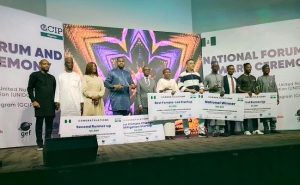The Global Cleantech Innovation Programme (GCIP) Nigeria on Thursday, April 25, 2024, in Lagos, under the second cohort of entrepreneurs’ scheme, celebrated the achievements of innovative small and medium-sized ventures within the nation’s cleantech sector.

The event, which offered a networking platform for individuals passionate about Africa’s cleantech ecosystem, is funded by the Global Environment Facility (GEF) and implemented by the United Nations Industrial Development Organisation (UNIDO) in collaboration with the Co-creation Hub and the Federal Ministry of Science, Technology and Innovation (FMSTI).
In a keynote address, Dr. Uche Nnaji, Minister of Science, Technology and Innovation, said: “The world is currently moving towards use of clean energy technologies and FMSTI, being aware of this, is currently conducting Technology Needs Assessment for Climate Change Mitigation and Adaptation in key sectors of the economy.”
Represented by Mr. Isa Buba, Director, Environmental Sciences, Technology Development of FMSTI, the Minister noted: “There can be no better time to commence this project than now. I therefore call on all Nigerians to embrace and support deployment of clean energy innovations and solutions across the various sectors of Nigerian economy.”
In a goodwill message, Mr. Reuben Bamidele, National Programme Officer, UNIDO Regional Office in Nigeria, pointed out that, according to World Bank (2022), Nigeria is a lower-middle-income country with a GDP of $472.64 billion and GDP per capital of $2,162 so Nigeria’s economy is heavily reliant on fossil fuels and petroleum which represents a huge percentage of its total export revenue.
He said: “Despite the importance of energy to the country’s economy, low access to modern energy services remains one of the principal constraints to Nigeria’s economic development. It is also important to note that Nigeria has one of the highest energy poverty rates in the world; about 47% of its population does not have access to grid electricity and those who do have access, face regular power cuts.
“Nigeria is particularly vulnerable to climate change. It is classified as one of the 10 most vulnerable countries in the world, according to the 2017 Climate Change Vulnerability Index. Nigeria’s contribution to global climate change is relatively small, though non-negligible. In 2018, an estimated 104.3 metric tonnes of carbon dioxide were emitted from fossil fuel combustion.
“Nigeria is a member state of the United Nations Framework Convention on Climate Change (UNFCCC) and is under obligation to the global convention but more importantly to the safety and wellbeing of its people and its environment.
“Nigeria with a population of over 200 million people is in dire need of innovations that are sustainable and environmentally friendly. Over 50 percent of the country’s population are youths which confers demographic dividend for discovering new, modern and clean innovations across various sectors.
“There is a dire need for clean technologies in and from Nigeria. This does not just help Nigeria with its climate change and Paris Agreement obligations but also cements Nigeria’s status as an emerging economic and technological giant. Nigeria’s youthful population can be used as an advantage for driving a clean technology development and application in the country,” he stressed.
In a goodwill message Akinwande Akinsulire, Startup Support Leader at 14-year-old Co-creation Hub, noted that the programme was launched two years ago with the vision to create a community where innovators, engineers, and tech enthusiasts could collaborate to address societal problems.
He said: “Since the project’s inception, we’ve worked closely with UNIDO and other Project Executing Entities to support 49 innovators (25 in the first cohort and 24 in this second cohort). Last year, Nigeria’s top three national winners represented our country at the Global Competition. Of those winners, Rita’s Ecobarter, clinched the global award for the best female climate solution in Vienna.
“This year, we invited innovations from across the country to participate in a virtual pre-accelerator workshop. Our expert team introduced essential business concepts and helped participants refine their pitches. We received over 180 applications, which our internal team narrowed down to the top 50. These were passed on to a committee of external judges who selected the top 24 innovations.”
Henry Lamba of Schrodinger Technologies Ltd emerged as the Overall Winner of GCIP 2024 Award with Victor Boyle-Komolafe of GIVO Africa as 1st Runner Up, Enohi Ukpebor (E-Sam Energy Solutions Ltd) as 2nd Runner Up, Sidikat Folami of FabriThread Cycle Limited emerged the Best Female-led StartUp and Enohi Ukpebor (E-Sam Energy Solutions Ltd) as Best Climate Mitigation StartUp respectively.
All winners are billed to embark on an all-expenses paid trip to Vienna, Austria, to represent Nigeria at the Global Competition in June 2024, at the same time all winners will be given automatic membership of Nigerian Association of Small and Medium Enterprise (NASME), as announced by Dr. Yerima Abdulrashid, President of NASME.
Dignitaries at the event include Oluyomi Banjo, National Programme Coordinator, Environment and Energy, UNIDO; Dr. Ngozi Ejiogu, Director, Rural Electrification Fund; and Mr. Ziad Maalouf, Managing Director, Seven Up Botting Company, among others.
By Ajibola Adedoye
